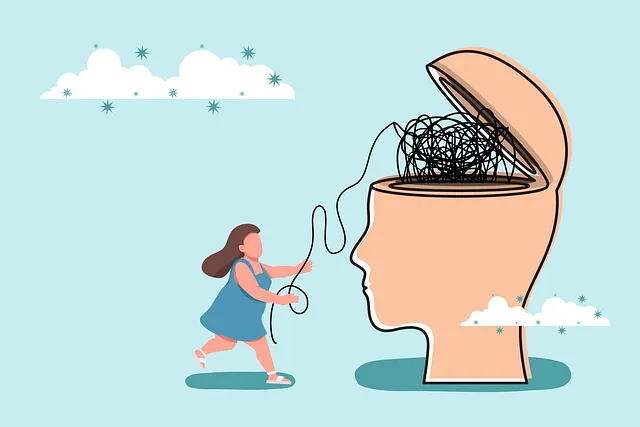Creating a safe and supportive environment at the Kaiser Permanente mental health center in Lafayette is crucial for effective group facilitation. This involves clear ground rules, active listening, open dialogue, self-esteem improvement techniques, burnout prevention strategies, structured yet flexible agendas, risk management planning, and cultural sensitivity. Facilitators play a vital role in ensuring participants feel valued and respected, fostering open communication about mental health challenges, and sharing self-care routines, ultimately enhancing the therapeutic experience.
In today’s digital era, mental wellness support groups play a pivotal role in fostering community and healing. This article explores effective facilitation techniques for mental health group sessions at the Kaiser Permanente mental health center in Lafayette, focusing on creating safe spaces. We’ll delve into strategies for establishing welcoming environments, promoting open communication, and fostering trust among participants. Additionally, we’ll uncover ways to enhance group dynamics through interactive activities, while empowering individuals to navigate their mental wellness journeys with support and self-awareness.
- Establishing a Safe and Supportive Environment
- – Creating a welcoming atmosphere
- – Setting ground rules and expectations
Establishing a Safe and Supportive Environment

Creating a safe and supportive environment is a cornerstone of effective group facilitation, especially in settings like the Kaiser Permanente mental health center Lafayette. This begins with establishing clear ground rules that emphasize respect, confidentiality, and active listening. Facilitators should encourage open dialogue where participants feel comfortable sharing their experiences without fear of judgment. Incorporating self-esteem improvement techniques can help build a sense of community and foster an atmosphere of understanding.
Additionally, integrating burnout prevention strategies for healthcare providers into group sessions is vital to managing the well-being of both facilitators and attendees. This involves creating structured yet flexible agendas that allow for diverse perspectives while ensuring every voice is heard. Effective risk management planning for mental health professionals is also crucial, focusing on identifying potential triggers and implementing strategies to mitigate risks, thereby enhancing the overall therapeutic experience in the Lafayette mental health center environment.
– Creating a welcoming atmosphere

Creating a welcoming atmosphere is paramount when facilitating mental wellness groups at a Kaiser Permanente mental health center Lafayette. Setting an inclusive space begins with warm greetings and a non-judgmental attitude, making participants feel seen and heard from the outset. Incorporating elements of self-care practices into the group setting further enhances comfort levels. This can include subtle reminders to take deep breaths or moments for personal reflection, encouraging a sense of calm and mindfulness.
Facilitators play a crucial role in cultivating cultural sensitivity within these groups, ensuring every individual feels valued and respected. By acknowledging and embracing diverse backgrounds, experiences, and perspectives, facilitators foster an environment that encourages open dialogue about mental health challenges and promotes the sharing of effective self-care routine development strategies for better mental health.
– Setting ground rules and expectations

Creating a safe and supportive environment is paramount when facilitating mental wellness groups at locations like the Kaiser Permanente mental health center in Lafayette. One effective strategy is establishing clear ground rules and expectations from the outset. This involves setting boundaries for group behavior, encouraging open yet respectful communication, and defining the purpose and goals of each session. By doing so, participants feel secure, knowing their voices will be heard without judgment.
Additionally, these ground rules can incorporate strategies like active listening, empathy, and confidentiality to foster a sense of trust. This not only enhances participation but also encourages individuals to share their experiences and learn from one another. The process aligns with the broader objectives of mental health centers, such as those outlined in a Risk Assessment for Mental Health Professionals, promoting an environment conducive to coping skills development and boosting individual confidence.
Group facilitation techniques, when implemented effectively in a safe and supportive environment, can significantly enhance mental wellness at Kaiser Permanente mental health center Lafayette. By creating welcoming spaces that foster open communication, facilitators can establish ground rules and expectations that promote trust and respect among participants. This approach not only improves individual mental health but also cultivates a sense of community within the group, ultimately benefiting everyone involved.






